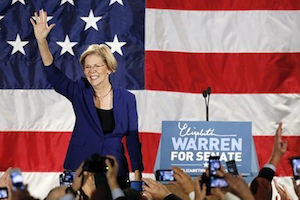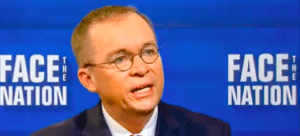Truthdigger of the Week: Elizabeth Warren
At a Senate hearing Thursday, Elizabeth Warren exposed and shamed regulators for failing to prosecute banks that played a leading role in the financial crisis.
If banking industry lobbyists hadn’t helped block Elizabeth Warren’s nomination to head the Consumer Financial Protection Bureau in 2011, she wouldn’t have become a senator who exposed and shamed regulators for failing to prosecute the banks responsible for the 2008 financial crisis.
After assuming office just a month and a half ago, Warren joined the chamber’s Democrat-dominated Committee on Banking, Housing and Urban Affairs. Newcomers to the Senate are traditionally expected to remain quiet, leaving it to senior members to lead hearings and investigations. But the resignation of fellow Massachusetts Sen. John Kerry last month left Warren as the senior representative of her state, giving her the leverage to do just what she wanted.
At her first hearing on banking regulation Thursday, Warren interrogated officials whose job it is to oversee and regulate the nation’s finance industry. She had a simple question for them: When was the last time you took a Wall Street bank to trial?
Thomas Curry, head of the Office of the Comptroller of the Currency, was the first to attempt an answer. “We do not have to bring people to trial,” Curry mumbled. “The primary motive for our enforcement actions,” he said, “is really to identify the problem and then demand a solution to it on an ongoing basis.”
This mushy, technocratic language is the means by which officials wiggle their way out of answering tough, straightforward questions. To much of the public, the speaker appears serious and genuinely concerned because the common person doesn’t understand what the official said. The effect is magnified if the official drones on.
Warren cut Curry off after 20 seconds. For the benefit of the public, she translated the term “consent order,” which he had used in his answer, into “settlement.” A greater percentage of listeners understand that a “settlement” is an agreement to forgo prosecution and accept payment without the accused party admitting wrongdoing. It is pointedly not a trial, which was the subject of her question. She asked it again.
Curry stammered and trailed off: “Well … we’ve actually had, uh, fairly, uh, fair number of, uh, consent orders. Uh, we do not have to bring the people to, uh, the, uh trial, or, and it. … ”
Warren broke in again. “Well I appreciate that you don’t have to bring them to trial,” she said. “My question is when did you bring them to trial?”
“We have not had to do it,” Curry explained, “as a practical matter to achieve our supervisory goals.”
Very slick. “What supervisory goals?” a listener might ask. “Whatever those goals are, are they sufficient for the maintenance of law, order and public well-being?” The public doesn’t get to ask, and because time in a hearing is limited, the questioner has to decide whether the respondent’s statement was sufficient to reveal the absurdity of his or her position.
In this instance, the responses Curry and his fellow regulators gave were adequate. It was clear they failed to prosecute any of the banks responsible for bringing on the financial crisis. Meanwhile, government attorneys around the country continue to aggressively prosecute average Americans for comparatively harmless offenses.
“You know, I just want to note on this,” Warren observed. “There are district attorneys and U.S. attorneys who are out there every day squeezing ordinary citizens on sometimes very thin grounds. And taking them to trial in order to make an example, as they put it. I’m really concerned that too big to fail has become too big for trial. That just seems wrong to me.”
Wall Street executives threw a fit over Warren’s inquiry. An anonymous executive who wrote in to Politico’s Morning Money said comments Warren made regarding discrepancies in the book and trading values of banks were “just plain wrong.”
“While Senator Warren had every right to ask pointed questions at today’s Senate Banking Committee hearing,” the “top executive” said, “someone ought to remind the Senator that the campaign is over and she should act accordingly if she wants to be taken seriously.”
Elites hate populists. Genuine public defenders like Warren break the convention of unquestioning respect for authority and hierarchy that enables so many elites to misbehave, and that has so corroded American democracy. For defying a corrupt tradition to benefit the public, we honor Elizabeth Warren as our Truthdigger of the Week.
See Warren in action below.
Senator Elizabeth Warren:
Your support matters…Independent journalism is under threat and overshadowed by heavily funded mainstream media.
You can help level the playing field. Become a member.
Your tax-deductible contribution keeps us digging beneath the headlines to give you thought-provoking, investigative reporting and analysis that unearths what's really happening- without compromise.
Give today to support our courageous, independent journalists.




You need to be a supporter to comment.
There are currently no responses to this article.
Be the first to respond.